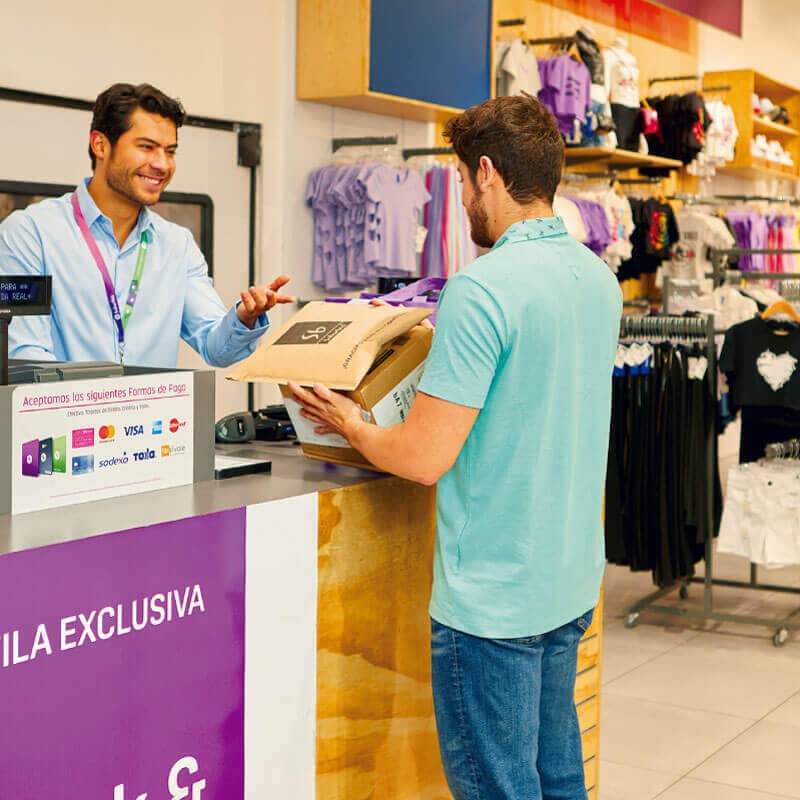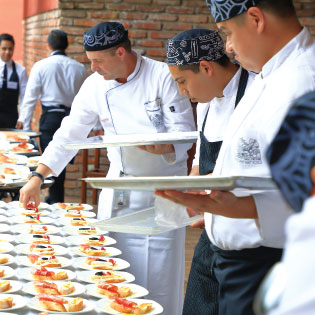Corporate governance dimension
| Achievements | |
|---|---|
| Ethics, self-regulation and grievance mechanisms | For the third year in a row, we ranked at the top of the Corporate Integrity 500 Index (IC500), for our stance against corruption and impunity and our support for transparency in Mexico. |
Code of Ethics signed by:
|
|
| 100% of reports to the ethics hotline were addressed by the appropriate actions or measures. | |
| Sustainable product development | Packaging for our online and Click & Collect sales is certified by the Forest Stewardship Council (FSC).. |
| Responsible consumption | 100% of our restaurants have H Distinction of Hygiene, and 66% use cage-free eggs. |
| Launch of “Modo Responsable” (Responsible Mode) and “Acciones que suman más” (Actions that add up), from Liverpool and Suburbia respectively, to promote products with sustainable features. | |
Governance structure and functions
(GRI 2-9, 2-10, 2-11, 2-12, 2-13, 2-15, 2-17, 2-18, 2-19, 2-20, 2-23, 2-24, 2-25, 405-1)
The Board comprises professionals recognized for their extensive business careers, which give them a seasoned perspective on the main risks and opportunities involved in the Group’s operations. It consists of 7% executive (related) members and another 40% non-executive related members. The remaining members are independent; there are no alternates.


Packaging for our online and Click & Collect sales is certified by the Forest Stewardship Council (FSC).
Members are appointed for annual terms, and to be reelected for an unlimited number of terms, although, as mentioned above, there is an age limit. The current average seniority of our board members is 17 years. Thirteen percent of our board members are women.
The Board meets quarterly, in ordinary sessions, and may also meet for extraordinary sessions when necessary. The average attendance this past year was 98%. The Board delegates certain responsibilities to the Audit and Corporate Practices Committee.
The Audit and Corporate Practices Committee supports the Board in overseeing compliance with the audit function and internal and external audits with the utmost objectivity and efficiency. It also checks to ensure the reliability of financial information and evaluates compliance with self-regulation and external regulations within the company. It is responsible for monitoring the management of specialized teams, which operate as established in the prevention and mitigation plans created to manage ESG risk factors.
There are specialized working groups that serve as complementary committees in areas relating to ESG factor management. El Puerto de Liverpool’s Footprint working session manages ESG priorities and the risk management structure, and is monitored by the Chief Executive Officer. This Working session keeps track of the progress of the sustainability strategy, meeting each quarter. It works through complementary working sessions organized according to the established strategic priorities (see the chapter on The Footprint of El Puerto de Liverpool).
The Group’s senior management comprises exemplary, experienced and committed professionals under the leadership of our Chief Executive Officer. They are closely involved in executing the sustainability strategy, actively leading or participating in driving the various initiatives we establish.
We have additional committees, each elaborated upon in the respective sections addressing the specific areas for which they bear responsibility: Integrity and Compliance Committee, and Ethics Committee.
Compensation for senior management is performance-based. It consists of a fixed portion and variable bonuses associated with the achievement of established annual targets, which, depending on the position, may include ESG aspects and the Group’s operating results. The CEO receives a variable bonus. It is calculated based on performance factors, strategic initiatives, and the consolidated operating result.
| Variable | % |
|---|---|
| Consolidated operating income | 25% |
| Logistics: delivery times | 10% |
| Suburbia operating income | 5% |
| Organizational climate | 5% |
| Technology: order management system | 20% |
| Technology: Planning, assortment and allocation | 15% |
| Technology: Transformation development | 10% |
| Succession plan | 10% |
reinforces our internal guidelines on corporate governance
The Board meets quarterly, in ordinary sessions, and may also meet for extraordinary sessions when necessary.
Integrity and ethics hotline
(GRI 2-15, 2-23, 2-24, 2-25, 2-26, 3-3, 205-1, 205-2)
Our company is known for its robust ethical culture and adherence to external regulations, which we reinforce with guidelines and implementation of internal ESG controls on corporate governance and anti-corruption in all our relationships with stakeholders.
Internal control has a training plan that is given every two years in our Code of Conduct and Integrity, to inform employees of the conduct we expect of them in all relationships arising from El Puerto de Liverpool’s activities, including anti-corruption. Employees must also receive annual training in ethics, money laundering prevention, and privacy issues.

Our compliance policies dictate the procedures to follow in higher-risk operations, with controls such as the Zero Tolerance Policy on Corruption and Bribery, Prevention of Conflicts of Interest, and Prevention of Money Laundering. These provide guidelines on relations with suppliers, outside parties, and donations. These policies are updated annually.
The Ethics Office and the Ethics Committee communicate relevant issues to the Audit and Corporate Practices Committee, which comprises Board Members and other individuals.
Responsible Sourcing
(GRI 3.3, 2-6, 308-1, 308-2, 414-1, 414-2, 416-1)
Our business partners—including domestic suppliers to Suburbia and domestic and international suppliers to Liverpool—are required to sign and apply our Supplier Code of Ethics. They are also required to obtain certifications in international sustainability standards.
We join forces with our value chain to positively impact society and the environment. Ensuring a sustainable supply chain involves auditing the workplaces of a selection of strategic suppliers (those with accounts of over $500,000 pesos in the year) aligned with the environmental laws, labor standards, and human rights regulations in the operating country. Suppliers are ranked according to a traffic light system so they can identify areas of opportunity where corrective measures are necessary. This is one way we work to develop a sustainable value chain, especially in building a circular economy.
Sustainable Product Development
GRI 3-3, 306-1, 306-2, SASB CG-EC-410a.2; CG-MR-410a.3
El Puerto de Liverpool focuses on offering, developing, and promoting products with sustainable features, especially those with certifications of compliance with international standards. We also work to be increasingly transparent in labeling information, and marketing guidelines have been improved to help Customers more easily identify and purchase these products.
Working together with our business partners, we select products that are sustainably produced and/or packaged, mainly those with certifications such as Forest Stewardship Council (FSC) in our private-label brands, including their packaging and labeling.

Better Cotton Initiative (BCI)
certification for some of Liverpool’s textile products
We are committed to also work toward sustainable packaging across all in all El Puerto de Liverpool operations. Our focus is focusing on responsible sourcing materials, reducing reduction of packaging, and obtaining certifications for effectiveness and durability, designed to be effective and durable. These actions are complemented by initiatives to increase recyclability and prevent waste from going to the landfill, by properly separating and handling materials.
We reduce environmental impact starting from the design of packaging and packaging materials; together with our business partners, we work on dematerialization of packaging for our own brands, lightening containers and incorporating post-consumer material in their manufacturing, and following guidelines for certification. This benefits the packaging we use in our online sales and Click & Collect.
Responsible Consumption
(GRI 3-3, 417-1,)
Liverpool, Suburbia, and our Boutiques Division have introduced ways to help Customers better locate products with sustainable features, through programs like “Modo Responsable (Responsible Mode) at Liverpool and “Acciones que suman más (Actions that add up) at Suburbia, where we point them to products that have certifications from the US Cotton Trust Protocol (USCTP), the Better Cotton Initiative (BCI), and the Forest Stewardship Council (FSC), as well as water savings and emissions reduction distinctions, among others.
In our Restaurants and Gourmet Experience areas, we took a big step towards our 2026 goal of using only cage-free eggs, securing the supply of 66% of our eggs nationally in 2023. We also added plant-based products to our offering during the year.
In the area of food safety, we have a comprehensive quarterly program involving food analysis, evaluation of hygiene standards in kitchen areas, and measures to guarantee that our food products are safe, including detailed inspections of both live and inert surfaces, in which 94.3% of our food met sufficient quality standards.
We have trained 2,056 employees in NOM-251-SSA1-2009 standard: Hygiene Practices for Food, Beverages, or Food Supplements Processing, totaling 10,280 training hours. Additionally, we have an onboarding program that is mandatory for all chefs upon joining the company.

Our Information Security Policy is part of a robust system that addresses potential cybersecurity risks..
We have the “H Distinction” program in all our restaurants, which is a recognition granted by the Ministry of Tourism (SECTUR) to fixed food and beverage establishments that meet the hygiene standards established in the NMX-F-605-NORMEX-2018 standard endorsed by the Ministry of Health.
In 2023, we also pledged to reduce food waste. Approximately 0.1% of our production is set aside for quality testing, after which it is donated. This initiative aligns with the Al Rescate program of the Mexican Food Bank Network, contributing to social responsibility by making better use of our products and benefiting those in need.
Data Governance
(GRI 3-3, 418-1, SASB CG-EC-230a.1; CG-MR-230a.1; FN-CF-230a.3)
El Puerto de Liverpool’s e-commerce infrastructure has international PCI-DSS standard certification for online card payments in Liverpool and Suburbia. This standard ensures consumer protection, helps reduce fraud, and prevents data breaches.
Cybersecurity is an integral component of our business continuity plans, which establish strategies and responsibilities for preventing and addressing potential risks so we can avoid any disruption to our operations. Internally, our employees abide by our Information Security Policy.
Within the Group, we are meticulous about responsibly managing data to ensure strict protection of Customers’ information. We value their privacy and welcome their exercise of Access, Rectification, Cancellation, or Opposition (ARCO) rights regarding their personal data. Detailed instructions for this process are provided on our website.

hours of training on food processing hygiene practices